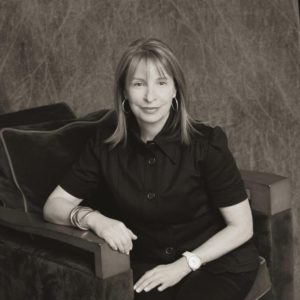Donor Profile: Lisa Stone Pritzker
 Lisa Stone Pritzker is an advocate and activist for the health and education of women, children and teens. She is the president and co-founder of a family foundation that works with organizations focusing on children’s health and education, the arts, and Jewish life and Israel. She was part of a team at UCSF Child and Adolescent Services at San Francisco General Hospital Medical Center whose research on funding barriers for victims of crime led to beneficial new legislation throughout California. In 2004, she was appointed to the First Five Commission, which funds statewide programs for children in their first five years of life.
Lisa Stone Pritzker is an advocate and activist for the health and education of women, children and teens. She is the president and co-founder of a family foundation that works with organizations focusing on children’s health and education, the arts, and Jewish life and Israel. She was part of a team at UCSF Child and Adolescent Services at San Francisco General Hospital Medical Center whose research on funding barriers for victims of crime led to beneficial new legislation throughout California. In 2004, she was appointed to the First Five Commission, which funds statewide programs for children in their first five years of life.
Stone Pritzker serves on a variety of committees and boards including the Board of Overseers for the University of California at San Francisco, Board of Trustees of the San Francisco Museum of Modern Art, and the Advisory Board for the Osher Center at UCSF. She is also on the Host Committee for the Jewish Funders Network’s 2019 International Conference, the National Advisory Council of Futures Without Violence, and the Leadership Council for Peer Health Exchange.
THE 180: How would you describe your personal mission in life?
LISA STONE PRITZKER: I try to lead a life filled with meaning and to follow a strong work ethic. As someone who is blessed with choices, I hope to make a difference in the lives of others. My goal is to lead an authentic life that values tradition, passion and purpose, and to model these ideas for my three sons and two daughters-in-law.
THE 180: How did children’s health and education come to be an area of focus in your philanthropic endeavors?
LISA STONE PRITZKER: I have always wanted to help children and families in underserved communities. They deserve equal access to health, education and enrichment opportunities.
THE 180: You have a long history of digging in to support the causes that you champion — as a volunteer, a funder and as a leader. What is your philosophy on how you engage and prioritize?
LISA STONE PRITZKER: I make an effort to come to the table with as much information as possible. I completed a Master’s degree in nonprofit administration to better understand how nonprofits work and what they really need. I also completed The Philanthropy Workshop Program, which brings together philanthropists committed to learning how to make lasting, positive change. I try to be a good listener and also to help develop networks for the nonprofits. Building a relationship with an organization’s leadership helps me to be an even stronger partner. Ongoing communication and transparency is critical. For me, philanthropy is much more than writing a check.
THE 180: What drew you to working with Turnaround for Children?
LISA STONE PRITZKER: I was deeply impressed by Turnaround founder Dr. Pamela Cantor’s research-based approach to addressing the needs of children who were struggling in school. I was excited by the potential of pairing the creation of data-based interventions with community-based partnerships.
THE 180: What about Turnaround’s work inspired you to support the mission?
LISA STONE PRITZKER: The idea that Turnaround works to achieve systemic change while at the same time touching the lives of so many children and educators really appeals to me. Pamela Cantor was looking to expand Turnaround’s reach and I was pleased to help support this.
THE 180: How does Turnaround help you accomplish your philanthropic goals?
LISA STONE PRITZKER: A data-driven approach can help successful interventions gain traction and scale. Turnaround has a track record of scaling programs and adapting successful models in new communities. I hope these learnings can benefit young people in schools and communities nationwide.
THE 180: What do you see as the greatest challenges in health and education today? What makes you hopeful about the future?
LISA STONE PRITZKER: Growing economic gaps have a ripple effect in health and education. Many parents and caregivers today are struggling to maintain affordable housing, put food on the table and support their children’s health and education. While this is even more true in today’s political climate, I am hopeful because organizations like Turnaround are creating new tools to assist. Technology today can also offer some educators and families easier and quicker access to helpful solutions and support.
THE 180: Can you tell us about a relationship that was important to your learning and development growing up?
LISA STONE PRITZKER: My great uncle, Jerome Stone, was a role model to me throughout my childhood and adult life. He was an amazing community leader until his passing at the age of 100. I hope to follow in his footsteps.
THE 180: If there were one thing you would want everyone to know about Turnaround, what would that be?
LISA STONE PRITZKER: Applying the science of brain development and related data in schools can help change lives in real time. An investment in Turnaround supports both field-changing research and direct service.

Share This Story